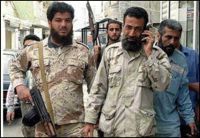Lebanese young men go to army to fight against Islamist militants in refugee camp
Six Lebanon's young soldiers are buried in the unkempt cemetery of the hilltop town Bibneen. They were killed not far away in a Palestinian refugee camp fighting against Islamist militants.

Three months of fighting at the Nahr el-Bared camp has for the first time made the military popular in Lebanon - but for impoverished towns like Bibneen, the army has long been a way of life and a source of income for youth who otherwise can find no work.
The toll paid by Bibneen is evident in its cemetery. "Do not count as dead those killed for the sake of God, for they are alive with their Lord," reads a Quranic verse carved into the six soldiers' tombstones, standing amid the weeds and litter. A seventh Bibneen resident killed in the battle is buried in the nearby city of Tripoli.
Young men from Bibneen and other Sunni towns and villages of northern Lebanon form the backbone of the force that is waging the army's drawn-out, two-month fight in the Palestinian camp.
Some 2,300 men from Bibneen - a town of 36,000 - are in the army, 150 of them deployed at Nahr el-Bared. The Lebanese army's Fifth Brigade, which is doing much of the fighting at the camp, draws many of its soldiers from Lebanon's predominantly Sunni north, particularly Akkar province where Bibneen is located.
Walid Sabsabi, 23, and his 20-year-old brother Ghazi followed their father Mohammed into the army. "People of Akkar like serving in the army. They're renowned for their bravery," said their father.
"The only reason I married him was because he was in the army," joked Mohammed Sabasi's wife, Umaima.
Walid - one of whose distant relatives was killed in the battle - was back home in Bibneen after being wounded five weeks earlier by a sniper at Nahr el-Bared. He and other fellow wounded soldiers from Bibneen - a short mountain drive east of the camp - spend their days watching the battle from their terraces, wishing they could rejoin the fight.
White plumes of smoke rise from the camp's tall buildings amid echoes of occasional artillery shells that drift over the two-story cement houses and orchards lying between Bibneen and the camp.
"What I wish most is to be down there," said Walid, glancing at the skeletal remains of the camps' buildings below. But he will have to wait for at least another six months before he can return.
Besides its toll in the fighting, the town has also suffered economically. Bibneen men who are not in the army are usually fishermen, but the fighting at the coastal camp has made it difficult to take out boats in the area.
"When we finish military conscription, we renew it because there are no jobs to be had," said Ahmed, a 26-year-old corporal from Bibneen who was also wounded.
Ahmed's salary is $500 a month. His injury should fetch him a one-time $75. He said there are no bonuses for soldiers in combat. He declined to give his last name because soldiers are generally not allowed to speak to the media.
The Nahr el-Bared conflict, in which at least 130 soldiers have been killed and more than 400 wounded, has for the first time in Lebanon's modern history rallied unprecedented support for the military from all of the country's sharply divided factions and religious sects.
It also marks the first real combat test for the country's weak military in nearly two decades.
For years, there had been a deliberate attempt to keep the army weak, partly as a tactic to prevent it from being used by one faction against the other - as happened during the 1975-90 civil war. The all-volunteer 65,000-member military has only 220 battle tanks and no effective air force.
But the fighting has transformed the military into a symbol of unity and pride for the country. Currently, Sunnis and Shiites roughly equally make up the bulk of the force - each between 35 to 40 percent - followed by the various Christian sects and Druse.
Army commander Michel Suleiman, a Maronite Christian, has become the only figure popular among all of Lebanon's religious sects. Banners in support of the army hang across streets in many parts of Lebanon. A new TV ad, proclaiming "soldiers, you are in our hearts," shows passers-by saluting as a young soldier walks down Beirut's main Hamra Street.
In Bibneen, Ahmed speaks every day by cellphone with his fellow soldiers still at the front. He says morale is still high, though frustration is starting to mount as the fighting drags on without an end in sight.
"Everyday, we're told there's going to be the final assault," he said. "They've destroyed much of the camp but the fighting continues."
Subscribe to Pravda.Ru Telegram channel, Facebook, RSS!


